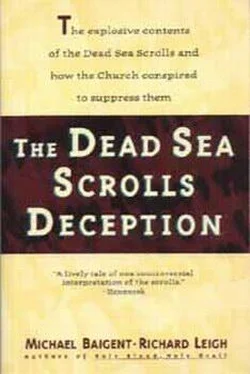It is important to understand that this was tantamount to exile. The community in Jerusalem, like that in Qumran, was preoccupied almost entirely with events in Palestine. The wider world, such as Rome, was relevant only to the extent that it impinged or encroached on their more localised reality. To send Paul off to Tarsus, therefore, might be compared to a Provisional IRA godfather sending a new, ill-disciplined and overly energetic recruit to muster support among the ‘Shining Path’ guerrillas of Peru. If, by improbable fluke, he somehow elicits men, money, materiel or anything else of value, well and good. If he gets himself disembowelled instead, he will not be unduly missed, having been more nuisance than asset anyway.
Thus arises the first of Paul’s three (according to Acts) sorties abroad. Among other places, it takes him to Antioch, and, as we learn from Acts 11:26, ‘It was at Antioch that the disciples were first called “Christians”.’ Commentators date Paul’s journey to Antioch at approximately ad 43. By that time, a community of the ‘early Church’ was already established there, which reported back to the sect’s leadership in Jerusalem under James.
Some five or more years later, Paul is teaching in Antioch when a dispute arises over the content of his missionary work. As Acts 15 explains, certain representatives of the leadership in Jerusalem arrive in Antioch, perhaps, Eisenman suggests, with the specific purpose of checking on Paul’s activities. 7They stress the importance of strict adherence to the Law and accuse Paul of laxity. He and his companion, Barnabas, are summarily ordered back to Jerusalem for personal consultation with the leadership. From this point on, a schism will open and widen between Paul and James; and the author of Acts, so far as the dispute is concerned, becomes Paul’s apologist.
In all the vicissitudes that follow, it must be emphasised that Paul is, in effect, the first ‘Christian’ heretic, and that his teachings — which become the foundation of later Christianity — are a flagrant deviation from the ‘original’ or ‘pure’ form extolled by the leadership. Whether James, ‘the Lord’s brother’, was literally Jesus’ blood kin or not (and everything suggests he was), it is clear that he knew Jesus, or the figure subsequently remembered as Jesus, personally. So did most of the other members of the community, or ‘early Church’, in Jerusalem — including, of course, Peter. When they spoke, they did so with first-hand authority. Paul had never had such personal acquaintance with the figure he’d begun to regard as his ‘Saviour’. He had only his quasi-mystical experience in the desert and the sound of a disembodied voice. For him to arrogate authority to himself on this basis is, to say the least, presumptuous. It also leads him to distort Jesus’ teachings beyond all recognition — to formulate, in fact, his own highly individual and idiosyncratic theology, and then to legitimise it by spuriously ascribing it to Jesus. For Jesus, adhering rigorously to Judaic Law, it would have been the most extreme blasphemy to advocate worship of any mortal figure, including himself. He makes this clear in the Gospels, urging his disciples, followers and listeners to acknowledge only God. In John 10:33-5, for example, Jesus is accused of the blasphemy of claiming to be God. He replies, citing Psalm 82, ‘Is it not written in your Law, I [meaning God in the psalm] said, you are Gods? So the Law uses the word gods of those to whom the word of God was addressed.’
Paul, in effect, shunts God aside and establishes, for the first time, worship of Jesus — Jesus as a kind of equivalent of Adonis, of Tammuz, of Attis, or of any one of the other dying and reviving gods who populated the Middle East at the time. In order to compete with these divine rivals, Jesus had to match them point for point, miracle for miracle. It is at this stage that many of the miraculous elements become associated with Jesus’ biography, including, in all probability, his supposed birth of a virgin and his resurrection from the dead. They are essentially Pauline inventions, often wildly at odds with the ‘pure’ doctrine promulgated by James and the rest of the community in Jerusalem. It is hardly surprising, therefore, that James and his entourage should be disturbed by what Paul is doing.
Yet Paul knows full well what he is doing. He understands, with a surprisingly modern sophistication, the techniques of religious propaganda; 8he understands what is necessary to turn a man into a god, and he goes about it more astutely than the Romans did with their emperors. As he himself pointedly acknowledges, he does not pretend to be purveying the historical Jesus, the individual whom James and Peter and Simeon knew personally. On the contrary, he acknowledges, in 2 Corinthians 11:3-4, that the community in Jerusalem are promulgating ‘ another Jesus’. Their representatives, he says, call themselves ‘servants of righteousness’ — a characteristic Qumranic usage. They are now, to all intents and purposes, Paul’s adversaries.
In accordance with instructions issued to him, Paul returns from Antioch to Jerusalem — around ad 48-9, it is generally believed — and meets with the community’s leadership. Not surprisingly, another dispute ensues. If Acts is to be believed, James, for the sake of peace, agrees to compromise, thereby making it easier for ‘pagans’ to join the congregation. Somewhat improbably, he consents to relax certain aspects of the Law, while remaining adamant on others.
Paul pays lip service to the leadership. He still, at this point, needs their endorsement — not to legitimise his teachings, but to legitimise, and ensure the survival of, the communities he has founded abroad. He is already, however, bent on going his own way. He embarks on another mission of travel and preaching, punctuated (Acts 18:21) by another visit to Jerusalem. Most of his letters date from this period, between ad 50 and 58. It is clear from his letters that he has, by that time, become almost completely estranged from the leadership in Jerusalem and from their adherence to the Law. 9In his missive to the Galatians (c. ad 57), he alludes scathingly to ‘these people who are acknowledged leaders — not that their importance matters to me’ (Gal. 2:6). His theological position has also deviated irreparably from those who adhere rigorously to the Law. In the same letter to the Galatians (2:16), he states that ‘faith in Christ rather than fidelity to the Law is what justifies us, and… no one can be justified by keeping the Law’. Writing to the Philippians (3:9), he states: ‘I am no longer trying for perfection by my own efforts, the perfection that comes from the Law…’ These are the provocative and challenging statements of a self-proclaimed renegade. ‘Christianity’, as it will subsequently evolve from Paul, has by now severed virtually all connection with its roots, and can no longer be said to have anything to do with Jesus, only with Paul’s image of Jesus.
By ad 58, Paul is again back in Jerusalem — despite pleas from his supporters who, obviously fearing trouble with the hierarchy, have begged him not to go. Again, he meets with James and the leadership of the Jerusalem community. Employing the now familiar Qumranic formulation, they express the worry they share with other ‘zealots of the Law’ — that Paul, in his preaching to Jews living abroad, is encouraging them to forsake the Law of Moses. 10It is, of course, a justified accusation, as Paul has made clear in his letters. Acts does not record his response to it. The impression conveyed is that he lies, perjures himself and denies the charges against him. When asked to purify himself for seven days — thereby demonstrating the unjustness of the allegations and his continued adherence to the Law — he readily consents to do so.
Читать дальше












